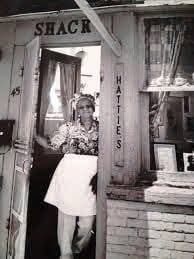In 1938, a young Black widow stepped off a bus in Saratoga Springs, New York. Her name was Hattie Moseley Austin.
She had no family with her—just $33, a worn cast iron skillet, and a heart full of flavors she remembered from her Louisiana childhood, though she had never been taught how to cook them, only tasted them.
Hattie had grown up tough. She had been orphaned at a young age, working hard cleaning homes and cooking for others. The Great Depression had stripped her of nearly everything—except her resilience and determination.
With just that one skillet and a lot of grit, she opened a small, 24-hour food stand and named it Hattie’s. She served fried chicken, cornbread, and biscuits that felt like a warm hug from home.
Soon, people began to take notice. Jockeys from the nearby racetrack came in. So did jazz musicians, locals, tourists—and even celebrities like Jackie Robinson, Cab Calloway, and Mikhail Baryshnikov found their way to her table.
Within a year, her food stand grew into a full restaurant. But the secret wasn’t just in the food; it was in Hattie herself. Her warmth, her welcoming nature, and her refusal to let anyone leave hungry, both in body and in spirit, were the true ingredients.
Hattie worked tirelessly until she was 92, and even long after she stepped away, Hattie’s Restaurant remained.
Food & Wine would eventually name her fried chicken the best in America. But if you ask anyone who knew her, they’ll tell you the real recipe wasn’t in the seasoning. It was in her soul.
She didn’t just feed people; she gave them something that lasted—love, dignity, and a place where they truly felt seen
